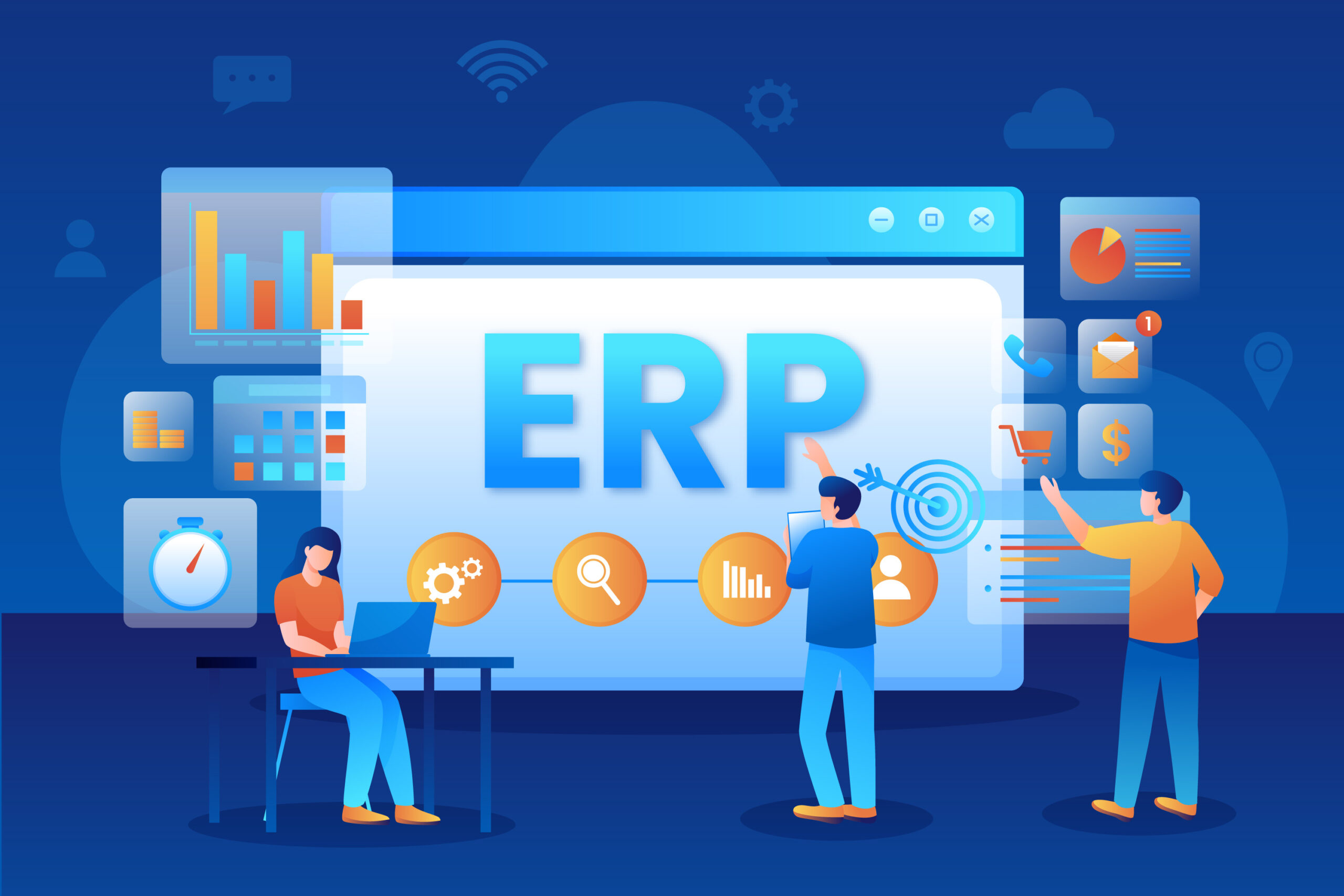Cloudpital # 1 is one of the top ERP nowadays is to remain competitive in a technology-driven world through digital transformation, which means adapting modern digital technologies to improve operations, deliver value to customers, and stimulate innovation. At the core of this change are the ERP systems, which serve as the foundation for integrating and optimizing business processes.
Click to Start Whatsapp Chatbot with Sales
Mobile: +966547315697
Email: sales@bilytica.com
Cloudpital # 1 ERP

Understanding ERP in the Context of Digital Transformation
ERP systems integrate and connect different business functions, such as finance, human resources, supply chain, and customer relationship management, into one framework. Digital transformation is about using technology to transform the business models and the ways of doing things for value delivery. ERP systems provide a foundational base for digital transformation by integrating processes and enabling automation through reducing the effort required and improving efficiency.
Real-Time Insights
Alignment of ERP systems with digital transformation strategies offers businesses an opportunity to streamline operations and respond to current market dynamics.
Centralized Data: Better decisions
The most significant contribution of the software systems in digital transformation is the centrally managed data. In setups which are traditional, data is usually spread amongst the departments; therefore, this results in inefficiency and inaccuracy. ERP systems solve this problem by:
- Consolidating Data: Storing all business information in a single database, ensuring accuracy and consistency.
- Facilitating Real-Time Access: Empowering stakeholders with up-to-date information for informed decision-making.
- Enhancing Reporting Capabilities: Providing customizable reports and dashboards for better performance monitoring.
Organizations like CloudPital leverage ERP systems to provide real-time insights, enabling businesses to stay agile in a dynamic environment.
Process Automation and Efficiency
Digital transformation is focused on automating repetitive tasks to increase efficiency and minimize errors. ERP systems contribute to this in the following ways:
- Automation of Workflows: Payroll, invoicing, and inventory management.
- Reduction of Manual Errors: Ensuring data accuracy and consistency across departments.
- Freeing Up Resources: Allowing employees to focus on strategic initiatives rather than administrative tasks. With ERP-driven automation, businesses can achieve higher productivity and operational efficiency.
Integration of Emerging Technologies
This has involved the implementation of new technologies like artificial intelligence, machine learning, and the Internet of Things in ERP systems. It is these technologies that take digital transformation to the next level by:
- AI-Driven Insights: Enhance probability by way of predictive analytics for better planning.
- IoT Integration: Allows real-time tracking of assets and the inventory.
- Machine Learning: Optimizes processes through continuous improvement data trends.
Cloud-based ERP solutions, such as those provided by CloudPital, allow businesses to easily embrace these advanced technologies.

Enhanced Customer Experience
Customer-centricity is a hallmark of digital transformation, and Telehealth systems help enhance customer experiences through:
- Centralization of Customer Data: A 360-degree view of customer interactions and preferences.
- Streamlining Order Management: Ensuring accurate and timely order processing.
- Personalized Services: Using data insights to tailor offerings and improve satisfaction.
Through integration of customer relationship management (CRM) functionalities, ERP systems allow businesses to establish better relationships with their clients.
Scalability and Flexibility
Scalability is a critical aspect of digital transformation as businesses grow and markets change. ERP systems support scalability in the following ways:
- Accommodating Growth: Allowing businesses to add new users, departments, and functionalities as needed.
- Adapting to Market Changes: Offering customizable modules that align with changing business requirements.
- Supporting Global Operations: Multi-currency, multi-language, and multi-location capabilities.
Cloud-based ERP systems are particularly beneficial as they can scale resources based on demand.
Supply Chain and Logistics
In those industries where supply chain efficiency is of prime importance, ERP systems are a must for digital transformation. They enhance supply chain management by:
- Real-time Monitoring: Inventory levels, shipments, and supplier performance.
- Optimizing Procurement: Automating purchase orders and vendor communications.
- Improving Predictive Capabilities: Analytics enables better demand prediction and inventory levels accordingly.
All these capabilities improve smooth operations, cost savings, and customer satisfaction.
Enhancing Data Security and Compliance
The digital transformation presents challenges in the security of data and compliance requirements. ERP software solves these problems through:
- Strong Security Measures: Ensuring data safety with encryption and access controls
- Supporting Industry Standards for Compliance: Automated compliance reports for the regulations of the industries.
- Maintaining Audit Trails: Detailed reports of all activities and changes would be maintained that can be traceable for all.
In times when data hacking and cyber-crimes are increasing so fast, having a secured software is very critical for sensitive data.
Remote Work Facilitation and Interoperability
Remote work continues to transform many industries rapidly through digitalization, and ERP ensures remote working of the system is possible by:
- Ensuring cloud services: The internet facility allows personnel to access a system from anywhere having an internet link.
- Real-Time Collaboration: Enabling teams to work together on a shared platform.
- Mobile Functionality: Supporting mobile applications to access critical data on the go. By providing remote working capabilities, ERP systems enable an organization to retain efficiency and continuity even during adverse situations.
Forging Innovation and Agility
Digital transformation is not about simply embracing new technology but is actually growing innovation and keeping agile in times of high market dynamism. EHR System drives innovation and keeps organizations agile by:
Encouraging Data-Driven Strategies: Empowering businesses to experiment with new ideas based on insights.
Facilitating Faster Time-to-Market: Streamlining processes to accelerate product development and delivery.
Adapting to Trends: Enabling quick responses to market shifts and consumer demands.
ERP systems, like those offered by CloudPital, act as enablers of innovation, ensuring businesses can adapt and thrive.
Conclusion
At the heart of a successful digital transformation is ERP systems, tools and infrastructure necessary for the optimal optimization of processes, better experiences for customers, and the ability to adapt to emerging technologies. Data centralization, process automation, and scalability all combine to enable companies to remain relevant in this modern world.
Investing in a strong ERP system, such as CloudPital, is a strategic move for organizations that want to embark on or accelerate their digital transformation journey. With its comprehensive features and adaptability, an ERP system not only supports current business needs but also positions organizations for future success in an increasingly digital world.
Click to Start Whatsapp Chatbot with Sales
Mobile: +966547315697
Email: sales@bilytica.com
The Role of ERP in Digital Transformation similar software solutions prices were updated on 2025-05-01T11:11:05+00:00 in Saudi Arabia in Mecca, Medina, Riyadh, Khamis Mushait, Yanbu, Jeddah, Dammam, Unaizah, Uqair, Ha’il, Ta if, Al Bahah, Dhahran, King Abdullah Economic City, Najran, Diriyah, Qatif, Khafji, Jubail, Abqaiq, List of Cities and Towns in Saudi Arabia, Ras Tanura, Turubah, Jazan Economic City, Knowledge Economic City, Medina, Khobar, Abha, Tabuk, Saudi Arabia, similar software solutions prices were updated on 2025-05-01T11:11:05+00:00 We also provide in Saudi Arabia services solutions company in Hafar Al-Batin, Udhailiyah, Al-Awamiyah, Hofuf, Hautat Sudair, Buraidah, Tayma, Duba, ‘uyayna, Saihat, Al-Kharj, Al-ula, Jizan, Rumailah, Ar Rass, Arar, Shaybah, Al Majma’ah, Rabigh, Dhurma, Haradh, List of Saudi Cities by Gdp Per Capita, Badr, Sudair Industrial City, Baljurashi, Shaqraa, Al-Khutt, Habala, Ad Dawadimi, Dawadmi, Layla, similar software solutions prices were updated on 2025-05-01T11:11:05+00:00 Price is SAR 100 and this was updated on updated on 2025-05-01T11:11:05+00:00 similar The Role of ERP in Digital Transformation software solutions prices were updated on 2025-05-01T11:11:05+00:00 in Saudi Arabia in Haql, Afif, Al-Abwa, Farasan, Al-Jaroudiya, Thadig, Al-Thuqbah, Al Wajh, Almardmah, Al-Zilfi, Muzahmiyya, Prince Abdul Aziz Bin Mousaed Economic City, Tharmada’a, Skaka, Um Al-Sahek, Sharurah, Tanomah, Bisha, Dahaban, Al Qunfudhah, Qurayyat, Saudi Arabia, Ha’ir, as Sulayyil, Al Lith, Turaif, Al-Gway’iyyah, Samtah, Wadi Ad-Dawasir, Az Zaimah, Safwa City, Jalajil, Harmah, Mastoorah, Hotat Bani Tamim, Jabal Umm Al Ru’us, Rafha, Qaisumah, Al-Ghat, Hajrah, Al-Hareeq. Excerpt: Jeddah (also spelled Jiddah, Jidda, or Jedda; Arabic: Jidda) is a Saudi Arabian city located on the coast of the Red Sea and is the major urban center of western Saudi Arabia similar software solutions prices were updated on 2025-05-01T11:11:05+00:00 Price is SAR 100 and this was updated on updated on 2025-05-01T11:11:05+00:00

